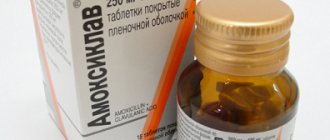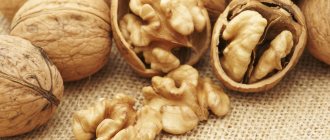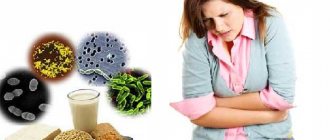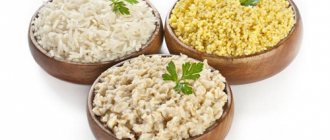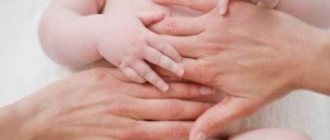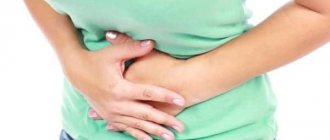Diarrhea, along with vomiting, is typical for various digestive pathologies - poisoning, intestinal infections of a viral or microbial nature, allergic reactions, pathologies of the small and large intestine. Diarrhea (or diarrhea) itself is not a disease, but only a sign of digestive disorders in the small and large intestines. Diarrhea occurs when the intestines are unable to absorb nutrients and water due to irritation, inflammation, increased motility, or a combination of these factors. Therefore, the treatment of diarrhea is the elimination of the cause that provokes it.
Not all cases require diarrhea tablets for adults. If it is one or two episodes of loose stools, a change in diet and elimination of the irritant is enough, digestion will normalize without any intervention. If diarrhea is frequent, accompanied by a violation of the general condition, fever, weight loss, nausea and vomiting, you should call a doctor. He will determine the cause of the disorder and select the necessary medications. They may be from different groups. On your own, without a doctor’s prescription, you can only use drugs from the group of sorbents and probiotics. If they do not help, you need to contact a specialist.
Types of Diarrhea Medicines
Current medications for loose stools are divided into 5 types:
- Probiotics are medications used to eliminate signs of dysbiosis.
- Medicines aimed at reducing contractions of the walls of the rectum are peristalsis.
- Antibiotics that eliminate intestinal infections that cause the disorder.
- Enterosorbents are components that bind exogenous and endogenous components in the esophagus and intestines through increased absorption, absorption, and ion exchange.
- Natural medicines that have a viscous and tanning effect.
Establishing diagnosis
The medical history focuses on the frequency and type of stool, and also relies on associated symptoms. The addition of temperature and vomiting indicates an infectious lesion of the gastrointestinal tract. The nature of the diet matters. Information about diarrhea, which began after the introduction of certain cereals (oats, wheat), indicates gluten enteropathy (celiac disease), information about a violation of the type of stool after including other products in the diet indicates food intolerance.
When examining the patient, the presence of signs of dehydration is taken into account, the general condition is assessed, and the abdomen is examined and palpated. Delay in physical development indicates more serious abnormalities in the body. In children with suspected cystic fibrosis, the condition of the internal organs is assessed.
Laboratory and instrumental research includes:
- determination of electrolyte levels during dehydration;
- determination of sodium and chlorine concentrations if cystic fibrosis is suspected;
- if an infectious process is suspected, examination for viruses, bacteria and parasites.
With celiac disease, an increased amount of specific antibodies is found in the blood. Diet changes can be used for both diagnosis and treatment.
Probiotics against loose stools
Probiotics are products that contain microorganisms that are natural to the intestinal environment. If the environment is imbalanced, probiotics rehabilitate the level of microorganisms, which helps improve stool. Today there are a huge number of probiotics used for diarrhea:
- Linex - has an antidiarrheal effect by improving intestinal microflora.
- Biifidumbacterin - improves the functioning of the stomach and intestines, suppresses a huge number of pathogenic bacteria.
- Bifikol is an antimicrobial drug, the components of which stabilize the intestinal microflora.
- Hilak Forte is a popular antidiarrheal drug. The advantage is considered to be the action in the intestinal lumen, the digestibility of food improves.
Symptoms of bloating
Gas-associated symptoms of bloating:
- increase in abdominal size;
- cramping abdominal pain and cramps;
- the presence of certain sounds (borborygms);
- frequent belching;
- heaviness in the stomach;
- uncontrolled release of gases;
- bowel disorder.
A person with bloating develops anxiety, a feeling of shame, minimizes social contacts and avoids visiting public places. Against this background, stress develops, which, in turn, has an even more negative effect on the intestines.
Antibiotics for diarrhea
Antibiotics for a disorder should be taken only if signs of the disorder are accurately identified. If such a problem is caused by intramuscular bacteria, then the use of antibiotics is considered a highly effective option. Visually, the presence of infection in the intestines is determined by certain secretions in the stool: mucus, blood. In such situations, the following must be taken:
- Levomycetin is an antimicrobial agent that destroys pathogenic microorganisms.
- Metronidazole has antimicrobial and antiprotozoal effects.
- Amoxicillin is a semi-synthetic penicillin.
Popular questions and answers
We asked questions about the causes of diarrhea and their elimination to gastroenterologist, therapist Vera Samsonova.
Why might there be diarrhea?
Bowel movement is a normal part of your life.
However, sometimes this process of removing waste from the body changes. When you have loose or watery stools, it is called diarrhea. This is a very common condition that usually resolves without intervention within a few hours. The cause of most self-limited diarrhea is usually not identified. The most common cause of diarrhea is a virus that attacks the intestines ("viral gastroenteritis"). The infection usually lasts a couple of days and is sometimes called "stomach flu." Other possible causes of diarrhea may include:
● infection by bacteria; ● infections of other organisms and toxins formed in them; ● eating foods that disrupt the digestive system; ● allergies and intolerance to certain foods (celiac disease or lactose intolerance); ● medicines; ● radiation therapy; ● malabsorption of food (dyspepsia).
Can antibiotics cause diarrhea?
Most antibiotics (clindamycin, erythromycins, and broad-spectrum antibiotics) can cause diarrhea. Antibiotics can change the balance of bacteria normally found in the intestines, allowing certain types of bacteria, such as C. difficile, to thrive. When microbial balance is disrupted, the colon can become overcrowded with harmful (pathological) bacteria that cause colitis (inflammation of the lining of the colon). Antibiotic-related diarrhea can start any time you take an antibiotic or shortly after you finish a course. If you experience this side effect, contact your doctor to discuss the best option to reduce this side effect.
What to do if you have diarrhea?
When you have diarrhea, you lose water and electrolytes in your stool. You need to drink plenty of fluids to replace lost water and salts. Dehydration can become serious if it is not corrected through diet and fluid intake.
Is it possible to do the treatment yourself?
During the day, you can switch to a light diet, take sorbents and an increased drinking regimen. If diarrhea does not go away, you need to see a doctor. You should not use various dubious “fixing” folk recipes, they can only do harm.
Enterosorbents for diarrhea
Taking enterosorbents is considered one of the most effective and high-quality drugs against loose stools. These are the most powerful instant-action anti-diarrhea tablets , which are aimed at eliminating toxic substances that have penetrated the esophagus and intestines from the outside. Among the most proven means are the following:
- Smecta is a natural remedy with a strong suction effect. Has selective sorption characteristics.
- Coal is a popular and effective drug. Ideally eliminates disorder and toxins.
- Polysorb is a natural product that absorbs toxins well and removes them out. This is exactly what saves adults from loose stools.
A few words about diarrhea
Diarrhea is a disorder in the functioning of the gastrointestinal tract.
Diarrhea, or, as popularly known, diarrhea, is an elementary disorder in the functioning of the gastrointestinal tract, which is accompanied by watery stool and other extremely unpleasant symptoms.
Regardless of the sterility of life, most likely, every person has encountered this disease at least once, so it has long been no longer a special curiosity.
Anyway. It is worth considering the basic provisions regarding the appearance and essence of diarrhea. To begin with, let us pay attention to the main causes of diarrhea in people of absolutely all ages, among which are:
- intestinal infection;
- staphylococcal microflora in the gastrointestinal tract;
- salmonellosis;
- hepatitis pathologies;
- temporary stomach upsets;
- adverse reactions to medications taken.
More accurately, the cause of diarrhea can be diagnosed either at home by the color of the stool, which is not always possible, or by carrying out special tests in the laboratory. Let us note that it is very important to correctly diagnose the cause of diarrhea, since it is taking into account the etiology of the disease that further measures to eliminate it are determined. As a typical example, consider the following signs indicating one or another cause of diarrhea:
- Foam in the masses of bowel movements and increased body temperature in a sick person appear in many types of intestinal infections.
- A greenish tint to the stool, fever and increased body temperature are characteristic of damage by staphylococcal microflora.
- A swampy color of stool and an increase in temperature are usually observed with salmonellosis.
- White diarrhea often indicates the presence of hepatitis.
- Feces that are not particularly different in color from normal, but are excessively watery, are a clear sign of a temporary gastrointestinal disorder caused by eating unwashed food and similar factors.
Despite the provisions presented above, do not forget that only a doctor can accurately determine the cause of diarrhea, therefore home diagnostic methods are only approximate and are not always applicable.
Antidiarrheal drugs of natural origin
What pills help against diarrhea in adults ? There are a number of plants that have antidiarrheal characteristics and are in demand in traditional medicine. They can be bought at the pharmacy, and their low cost makes them accessible to everyone. If you need good tablets for diarrhea in adults , below are the following:
- Bird cherry.
- Blueberry.
- Burnet root.
- Pomegranate.
Now you know which pills you need to take first if you suddenly have diarrhea.
What foods cause bloating?
If a healthy person eats foods that increase gas formation in the intestines and feels discomfort, you just need to review your diet and eliminate such foods - then no treatment is needed, the discomfort will go away on its own.
There are groups of foods that cause bloating (a negative reaction can occur to either one product or several):
- Products containing coarse fiber or fructose (apples, grapes, onions, tomatoes, cabbage, turnips, legumes and peas).
- Products that cause fermentation in the intestines (rye bread and pastries).
- Products with gluten (cereals, various sausages, sauces).
- Dairy products (when the body has a special enzyme to digest certain proteins and lactose).
To the list of products that cause gas formation, you should also add fast carbohydrates, sweets, sweet carbonated drinks, kvass, beer, etc. By the way, the formation of gases is also affected by how a person eats. You can’t eat on the go, snack frequently, eat a lot of fatty or spicy foods, or talk while eating.
If a person eats too many fruits, vegetables and legumes, fiber and fructose are poorly absorbed (or not absorbed at all) by the body. Such products rot in the intestines, and this is a haven for bacteria. Therefore, if you do not often eat vegetables and fruits, it is better to add them to your diet gradually.
In addition to specific products, some combinations of them also cause increased gas formation. For example: cereals with milk, sour vegetable products and grains, fresh bread with kefir.
In order not to provoke increased gas formation, eat fruits after the main meal, do not combine several types of fruits. It is advisable to bake or stew foods rich in fiber, and peel fruits and vegetables. Before cooking legumes, it is better to soak them. By the way, the safest in terms of gas formation is lentils.
Foods that cause bloating
Photos from open sources
